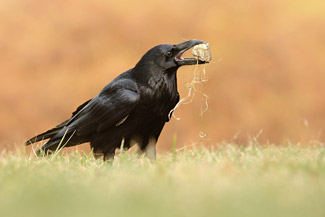Can ravens plan?
 Grabbing an umbrella as we walk out the door demands a type of planning that requires us to be able to remove ourselves from the current situation (it’s not raining right now…) To project into the future (...but it might rain). This is based on elaborate cognitive skills that, up until now, were thought to only exist in humans and great apes. But a new study shows that ravens may also be capable of organizing by thinking about the future. How did the scientists make this surprising discovery?
Grabbing an umbrella as we walk out the door demands a type of planning that requires us to be able to remove ourselves from the current situation (it’s not raining right now…) To project into the future (...but it might rain). This is based on elaborate cognitive skills that, up until now, were thought to only exist in humans and great apes. But a new study shows that ravens may also be capable of organizing by thinking about the future. How did the scientists make this surprising discovery?Whether preparing dinner or a business plan, planning involves anticipating events and making decisions based on this "analysis." While this ability is specific to humans, several studies have already indicated its presents in great apes. Among corvids (the family to which ravens belong), the ability to plan beyond the present moment has already been demonstrated, but the topic has been open to debate as the observation is limited to the fact that the birds hide food for later.
In the study carried out at Lund University (Sweden), the researchers wanted to explore the planning abilities of crows and their ability to adapt using a protocol that reproduces four experiments with primates. Each of them involved two conditions (one technical and one social) that offered the ravens the possibility to resolve tasks for which they have no behavioral predisposition: using a tool and interacting with humans. Can Kabadayi and Mathias Osvath tested five ravens (3 females and 2 males) on their ability to make a decision about a future event (experiment 1 and 2), as well as their patience and self-control (experiments 3 and 4).
The scientists first taught the ravens how to open a box (which contained a delightful culinary reward) using a tool. Later, the birds had the choice between the tool (the box was absent) and distractors (which weren’t functional). Almost all of the ravens chose the tool and were able to use it 15 minutes later. When the time between the selection of the tool and its use was voluntarily extended to 17 hours, the tool was still chosen in 88.8% of cases. In other situations, the ravens had the opportunity to exchange a token for a piece of food. The exchanges were conclusive 77.6% of the time (after 15 minutes) and even 95.8% (after a period of 17 hours).
To complicate matters, what happened when the ravens were given the choice between the tool, the token, the distractors and an immediate reward? The subjects selected the tool in 73.8% of trials and the token in 73.2% of trials. It’s clear that ravens can show self-control! According to Mathias Osvath, the results suggest “one needs a collection of cognitive abilities working in concert, such as inhibitory skills and different forms of memory.” The researchers even noticed that, like humans, the ravens chose the tool or token with the idea of being able to use it fairly quickly. This is analogous to human behavior with the same well-known psychological mechanism where the more you wait, the more the reward loses its appeal.
In conclusion, this study shows that ravens have the ability to plan, to make decisions outside of their present context. On this point, they are on par with the great apes. For tool selection and self-control ravens appear to be at least as competent as the great apes, and for bartering they even surpass the abilities of orangutans, bonobos, and chimpanzees.
Source: Can Kabadayi & Mathias Osvath, “Ravens parallel great apes in flexible planning for tool-use and bartering”, in Science, vol. 357, July 2017







